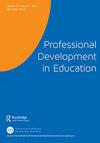Beyond reproduction: the transformative potential of professional learning
IF 3.1
3区 教育学
Q1 EDUCATION & EDUCATIONAL RESEARCH
引用次数: 0
Abstract
There is an often unquestioned assumption that professional learning and development (PLD) is unequivocally a ‘good thing’ (Stevenson 2019). However, this assumption belies a much more complex situation, fraught with challenges. Numerous studies have demonstrated that teachers can experience significant barriers when trying to access PLD (OECD 2014), including limited access to appropriate opportunities, having insufficient time to undertake the opportunities that are available and that even when teachers do participate in PLD activities, impact can be limited (McChesney and Aldridge 2021). These are important challenges and should not be dismissed. However, they tend to generate policy responses that focus only on identifying ‘what works’ solutions within a set of parameters that do not question ‘what matters’ (Biesta 2007). Professional Development in Education has done much over the years to seek to move beyond this debate about structural challenges and practical solutions, and to open up discussion about more fundamental questions such as who is PLD for, who should decide, and what should it look like? We have sought to open up a discussion about ‘transformative professional learning’: both what it is and what it might be. This work has assumed many forms over the years, but a significant moment was the publication of Aileen Kennedy’s (2005) article ‘Models of Continuing Professional Development: A framework for analysis’ which distinguishes between transmissive and transformative modes of professional learning. These issues have been reflected since in ongoing debates within the journal and highlighted in the recent special issue on ‘Non-linear perspectives on teacher development: complexity in professional learning and practice’ (vol. 47, issues 2 and 3). However, despite these discussions, much of the research relating to professional learning remains focused on transmissive models that fail to question the fundamentally reproductive nature of much PLD. These initiatives are often managerially imposed, embedded within performative structures and are central to encouraging cultures that value conformity and compliance over radical change. Although such approaches have often co-opted the language of transformation, the reality suggests that very little is being transformed. The danger is that the language of ‘transformation’ becomes accepted as a contemporary ‘common sense’ – over-used and under-analysed. The ultimate irony is that learning processes that claim to be about change play a key role in reinforcing existing structures and their linked inequalities. In this Special Issue of PDiE, we explore the potential of professional learning to be disruptive – to challenge current inequalities, dominant ideas, and established orthodoxies. We seek to understand how professional learning can be genuinely transformative, not only by opening up possibilities that may be beyond our current imagination, but which connect abstract and conceptual thinking with practical actions capable of bringing about real change – what Freire (1970) called ‘conscientization’. We consider transformative professional learning to be that which enables critical consciousness, what Mezirow (1981, p. 6) describes as an awareness and understanding of ‘how an ideology reflects and distorts moral, social and political reality and what material and psychological factors influence and sustain the false consciousness which it represents – especially reified powers of domination’. Transformative professional learning is therefore liberatory and emancipatory, but at times also ‘disorienting’ (Mezirow 1991). Our intention in curating this special issue is to provide an impetus for a more joined up attempt at challenging the dominant approach to professional learning which focuses on attempts to PROFESSIONAL DEVELOPMENT IN EDUCATION 2023, VOL. 49, NO. 4, 581–585 https://doi.org/10.1080/19415257.2023.2226971超越再生产:专业学习的变革潜力
人们通常毫无疑问地认为,专业学习和发展(PLD)无疑是一件“好事”(Stevenson 2019)。然而,这种假设掩盖了一个更复杂的情况,充满了挑战。许多研究表明,教师在尝试获得PLD时可能会遇到重大障碍(OECD 2014),包括获得适当机会的机会有限,没有足够的时间来承担可用的机会,即使教师参与PLD活动,影响也可能有限(McChesney和Aldridge 2021)。这些都是重要的挑战,不应被忽视。然而,他们倾向于产生政策反应,只关注在一组参数中确定“什么有效”的解决方案,而不质疑“什么重要”(Biesta 2007)。多年来,教育专业发展已经做了很多工作,试图超越这种关于结构性挑战和实际解决方案的辩论,并就更基本的问题展开讨论,如PLD是为谁服务的,谁应该决定,它应该是什么样子?我们试图开启一场关于“变革性专业学习”的讨论:它是什么,它可能是什么。多年来,这方面的工作呈现出多种形式,但一个重要的时刻是艾琳·肯尼迪(2005年)的文章《持续专业发展模型:分析框架》的发表,该文章区分了专业学习的传播模式和变革模式。这些问题已经反映在杂志内部的持续辩论中,并在最近的特刊“教师发展的非线性视角:专业学习和实践的复杂性”(第47卷,第2期和第3期)中得到强调。然而,尽管有这些讨论,许多与专业学习相关的研究仍然集中在传播模型上,这些模型未能质疑许多PLD的根本繁殖性质。这些计划通常是管理强加的,嵌入在执行结构中,并且是鼓励重视一致性和遵从性而不是激进变化的文化的核心。尽管这些方法经常采用“转型”的语言,但现实表明,转型的东西很少。危险在于,“转型”的语言被当作一种当代的“常识”来接受——被过度使用而分析不足。最具讽刺意味的是,那些声称与变革有关的学习过程,在强化现有结构及其相关的不平等方面发挥了关键作用。在本期PDiE特刊中,我们探讨了专业学习具有颠覆性的潜力——挑战当前的不平等、主导思想和既定的正统观念。我们试图理解专业学习是如何真正具有变革性的,不仅是通过开辟可能超出我们当前想象的可能性,而且是通过将抽象和概念性思维与能够带来真正变化的实际行动联系起来——Freire(1970)称之为“责任心”。我们认为,变革的专业学习是使批判意识成为可能的学习,Mezirow(1981,第6页)将其描述为“意识形态如何反映和扭曲道德、社会和政治现实,以及什么物质和心理因素影响和维持它所代表的虚假意识——特别是物化的统治权力”的意识和理解。因此,变革性的专业学习是解放和解放的,但有时也会“迷失方向”(Mezirow 1991)。我们策划这期特刊的目的是为更联合的尝试提供动力,以挑战专业学习的主导方法,该方法侧重于2023年教育专业发展的尝试,第49卷,第1期。4,581 - 585 https://doi.org/10.1080/19415257.2023.2226971
本文章由计算机程序翻译,如有差异,请以英文原文为准。
求助全文
约1分钟内获得全文
求助全文
来源期刊

Professional Development in Education
EDUCATION & EDUCATIONAL RESEARCH-
CiteScore
6.30
自引率
4.80%
发文量
27
 求助内容:
求助内容: 应助结果提醒方式:
应助结果提醒方式:


